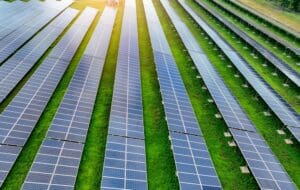
Tesco and Shell have struck a deal to purchase the entire output from the Cleve Hill solar farm, the UK’s largest solar project, which was initially planned to power 100,000 homes.
The agreement sees 65% of the farm’s electricity going to Tesco’s supermarkets, while Shell will manage the remaining 35% for its growing network of electric vehicle (EV) charging stations. The solar farm is expected to go online in early 2025.
The Cleve Hill project, situated on 860 acres of the Kent coast near Faversham, has been a source of controversy since its approval, with local opposition focused on its impact on the Graveney Marshes, a site renowned for its wildlife. Despite protests, the project was greenlit in 2020 by then energy secretary Alok Sharma. The farm, once pitched as a solution to power local homes, is now being used to meet the demands of corporate giants.
Vicky Ellis of CPRE (Campaign to Protect Rural England) Kent voiced frustration, stating: “This project was approved on the premise that it would power homes, not petrol stations and supermarkets. The irony of a major supermarket and an oil giant benefitting from a project labelled as a green energy initiative is not lost on us.”
The project, financed by US-based Quinbrook Infrastructure Partners, will include 560,000 solar panels, generating 373 megawatts (MW) of power—equivalent to half the output of a small gas-fired power station. Some of the solar panels will be mounted on steel frames almost as tall as a double-decker bus due to flood risks in the area.
Tesco’s power purchase agreement with Cleve Hill will account for up to 10% of its UK electricity demand, helping the supermarket meet its sustainability targets. “Cleve Hill solar park, with its ability to generate up to 10% of our UK electricity demand, joins a number of other Power Purchase Agreements we’ve announced over the last five years,” said Tesco CEO Ken Murphy.
Meanwhile, Shell’s portion of the output will support its EV charging network across the UK. With a 10-year agreement in place, Shell’s involvement underlines its ambitions in the renewable energy market, despite ongoing criticism of its core oil business. Shell Energy Europe’s head of power trading, Rupen Tanna, emphasised that renewable energy deals like Cleve Hill are essential to achieving the UK’s net-zero targets.
The Cleve Hill solar farm is expected to be eclipsed by even larger projects approved by the UK government, including the 600MW Cottam solar farm in Lincolnshire. Solar Energy UK’s CEO Chris Hewett noted that the industry aims to triple solar capacity by 2030, stating, “We can expect to see more deals like these in the coming years, as the industry scales up to reach 50 gigawatts of generation capacity.”
Despite its environmental benefits, Cleve Hill continues to spark debate. Ms Ellis and other critics argue that the transformation of the marshlands into a commercial energy hub compromises its natural beauty and wildlife, undermining the original promise of green energy for local homes. As the UK races to expand renewable energy infrastructure, the tension between corporate interests, environmental sustainability, and local communities remains an ongoing issue.
Read more:
Tesco and Shell to power stores and EV stations with output from UK’s largest solar farm, originally meant for homes





